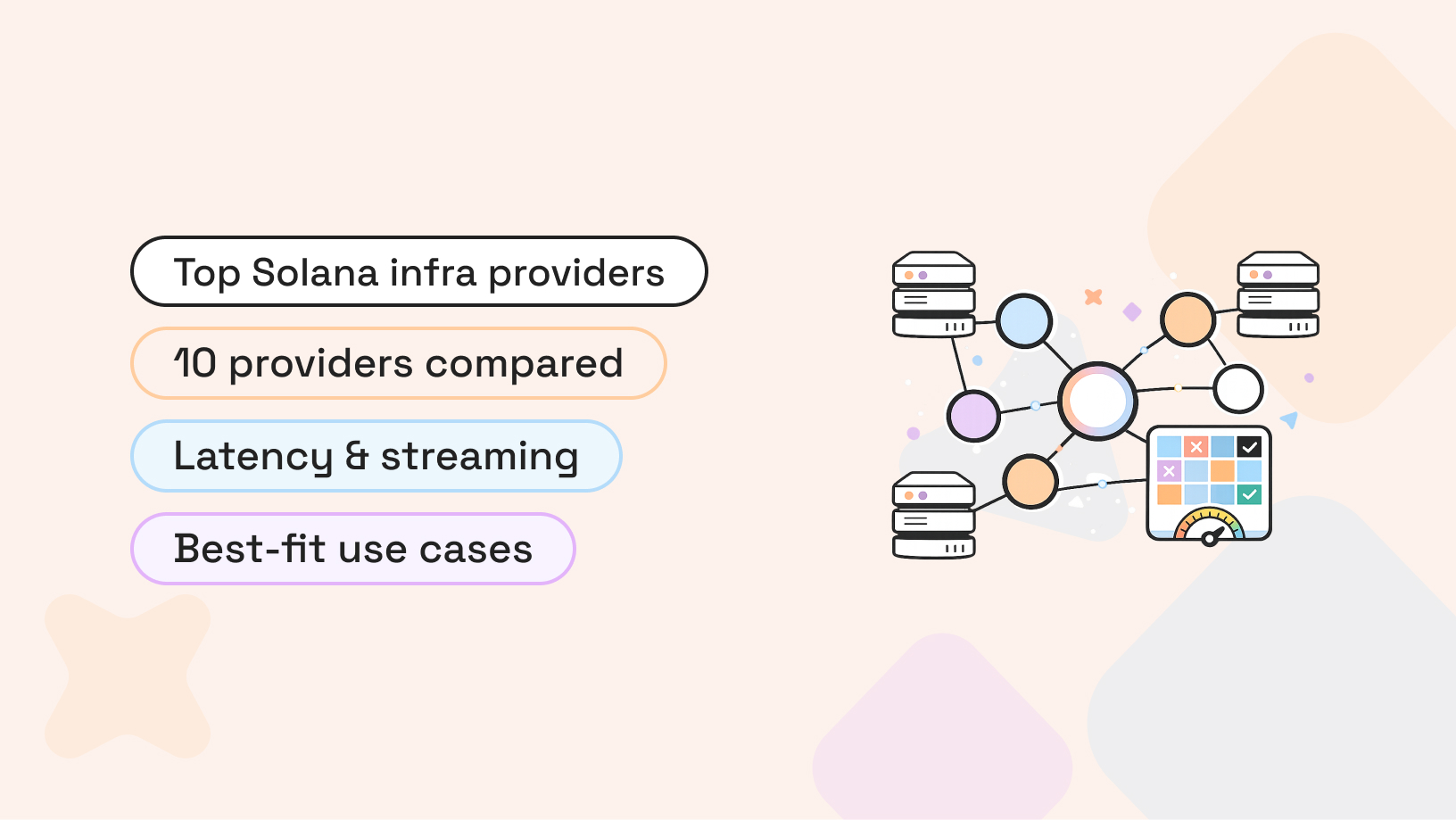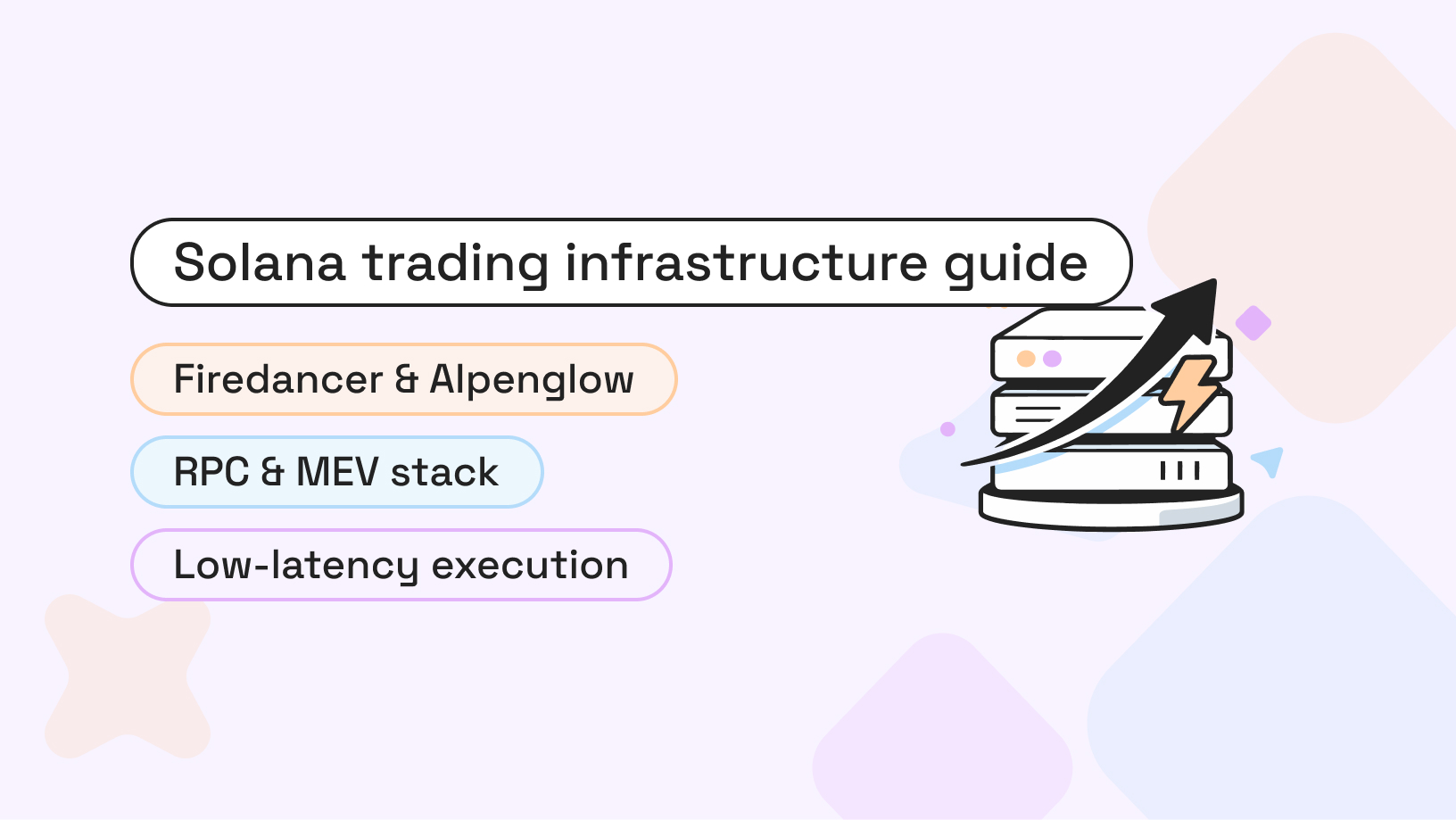
RPC nodes handle the core workload behind every transaction, trade, and on-chain signal. When you build a production-grade dApp or run automated strategies, you rely on your RPC provider to deliver speed, stability, and accurate data. Any delays or bottlenecks at this level affect everything else—from logic execution to user experience and revenue flow.
In 2026, latency, stability, and isolation matter more than ever. You don’t want “OK” response times or shared queues. You want fast confirmations, first-block execution, and infrastructure that stays solid under pressure.
So, this list of RPC node providers highlights the top options for teams that treat performance as a priority.
RPC Fast
Let’s be honest—we couldn’t start this list with anyone else. The name says it all: RPC Fast. We’ve built our entire stack around one goal to be the fastest, most reliable RPC infrastructure on the market. And no, the name wasn’t just clever branding. We meant it.
For over seven years, we’ve powered high-frequency trading bots, sniping tools, cross-chain routers, and indexing systems—all with dedicated Solana RPC nodes, <4ms latency, 99.99% uptime, and zero rate limits. Every node runs on isolated infrastructure, with mempool priority, MEV protection, and region-specific clustering baked in.
We offer three infrastructure tiers, from ready-to-go RPC access with monitoring and restarts, to bare-metal clusters with private load balancers, fast failover, and full observability (Prometheus, Grafana, Sentry). Deploy across GCP, AWS, or bare metal — wherever performance matters.
With $10B+ in transaction volume and 20M+ daily RPCs, RPC Fast helps serious teams move fast, ship confidently, and never wait on their infrastructure.
Why RPC Fast leads:
- Ultra-low latency (<4ms) RPC;
- Solana-ready HFT nodes with mempool priority;
- Custom node clusters with failover and geo-routing;
- Full monitoring stack: Grafana, Prometheus, Sentry-ready;
- MEV protection, no credit limits, zero multi-tenancy;
- Dedicated engineering support & onboarding;
- Live in 24 hours — fully set up and production-ready.
Alchemy

Next up is Alchemy—one of the most recognized names in the RPC space, and for good reason. Known for its developer-friendly tools and stable infrastructure, Alchemy supports 37 chains and offers scalable throughput up to 300 RPS. It's a popular choice for teams looking to move fast, thanks to its polished dashboard, team access features, and built-in analytics. While it covers most use cases well, limited MEV protection and pricing that scales quickly can make it less flexible for high-volume operations.
Ankr

Ankr offers one of the widest multi-chain RPC infrastructures, with support for over 70 blockchains and a high throughput ceiling of up to 1,500 RPS. Its platform is fully shared, meaning no dedicated nodes, but it makes up for that with fast global routing, MEV protection on select chains, and crypto-friendly payment options. Ankr is well-suited for projects that need scalable, affordable access across many chains without deep infrastructure customization. Enterprise users can negotiate flexible rate limits, preferred chains, and engineering support.
Chainstack

Chainstack positions itself as a fully managed RPC infrastructure provider with enterprise-level deployment options and a strong focus on speed, customization, and hybrid cloud control. Unlike Ankr or Alchemy, Chainstack allows users to deploy dedicated nodes inside their own cloud environments using the Hybrid Cloud feature—a major plus for enterprises with strict compliance or performance needs.
Performance is another key focus. With Warp Transactions, Bolt Sync, and Chainstack Cloud, teams get near-zero latency, fast node boot times, and private networking that removes unnecessary internet hops, especially valuable if your app runs on AWS or GCP. Their tailored load balancing and multi-channel support (Slack, Discord, Telegram) round out a platform designed for mission-critical apps that require both speed and reliability.
Moralis

Moralis is known more as a Web3 development platform than a core RPC infrastructure provider. While it does offer RPC access to 24 chains, the focus is on ease of integration and event streaming rather than high-throughput or low-latency performance. It's commonly used to add blockchain capabilities into consumer apps like wallets, games, or NFT dashboards, without diving deep into node management.
With subscription-based pricing, Moralis provides SLAs and some throughput scaling at the Business and Enterprise levels. However, it lacks core developer-facing features like debugging APIs, team collaboration tools, and MEV protection. For apps with light to moderate RPC needs and a strong emphasis on event streams or rapid prototyping, it’s a viable fit, but not ideal for infrastructure-heavy or trading-centric use cases.
GetBlock

GetBlock stands out as a flexible RPC provider with support for over 50 blockchains and a strong focus on infrastructure transparency and deployment control. Teams can choose between shared or dedicated nodes—hosted either on GetBlock’s bare-metal servers in Frankfurt and US-East, or inside their own AWS environments with help from the GetBlock team.
With RPS capacity up to 300, unlimited API keys, and usage dashboards, it’s a good match for multi-chain dApps that need essential observability and reliability without enterprise overkill. Pricing is clear and commitment-based discounts are available, making it one of the more predictable providers in this category. While it doesn’t offer MEV protection, the ability to customize, self-host, and receive 24/7 tech support makes it appealing for mid-size and scaling teams.
Tatum

Tatum blends RPC access with a full-stack Web3 development platform, offering a unified framework for building across 60+ blockchains. Its RPC service prioritizes ease of use, fast integration, and developer tooling, making it a go-to for teams who want to build quickly without managing infrastructure directly.
With up to 200 RPS, unlimited API keys, and built-in load balancing, Tatum provides stable performance for most general-purpose apps. However, it doesn’t include debugging tools or MEV protection, and node control is minimal. Tatum is ideal for projects looking for wide chain coverage, rapid scaling, and developer-first workflows rather than fine-grained infra management.
Blockdaemon

Blockdaemon is built for the enterprise, offering institutional-grade RPC access, staking services, and infrastructure monitoring across 23 supported chains. Its platform emphasizes redundancy, compliance, and reliability, making it a trusted partner for financial institutions and protocols with strict uptime and data integrity requirements.
With SLAs, archive node access, and advanced monitoring, Blockdaemon fits well into regulated or large-scale environments. However, API key limits, lack of MEV protection, and custom-only pricing make it less accessible for startups or high-frequency projects. For Solana-focused institutions and protocols prioritizing security and control, Blockdaemon remains a strong contender.
dRPC

dRPC delivers one of the most robust decentralized RPC infrastructures on the market, with support for 95+ blockchains, up to 5,000 RPS throughput, and intelligent request routing across 7 geo-distributed clusters. Instead of relying on centralized hardware, dRPC aggregates infrastructure from 50+ independent node operators, dynamically routing traffic based on latency, health, and location.
With full archive support, real-time analytics, debug APIs, and MEV protection, dRPC offers both transparency and control for cross-chain teams operating at scale. Whether you're building a high-volume production app or a latency-sensitive trading tool, its flexible architecture and enterprise-grade SLA (99.99%) make it a standout for demanding Web3 workloads.
Allnodes

Allnodes is a non-custodial hosting platform that empowers teams to run full nodes, validator nodes, and masternodes across more than 120 networks. Unlike RPC API services, Allnodes focuses on giving you control over your infrastructure—with options to choose CPU, RAM, storage configuration, and region. Their bare-metal Solana hosting, for instance, offers up to 200 Gbps bandwidth and sub-millisecond latency, making it a solid choice for infrastructure-heavy setups.
Allnodes is especially favored by teams that want self-hosted reliability without needing deep DevOps expertise—they handle updates, monitoring, and backups. A Reddit user put it simply:
“I pay them $20/mo … apart from claiming rewards, I forget it. It’s well worth my time.”
QuickNode

QuickNode combines multi-chain breadth with enterprise-grade performance, offering RPC access to 70+ networks and up to ~400 RPS on standard plans. With instantly deployable services, global auto-routing, and optional Dedicated Clusters—fully isolated, load-balanced nodes—QuickNode delivers both convenience and control. Its offering suits teams ranging from rapid prototyping to production-grade deployments, including low-latency trading and archival querying. Complemented by debugging tools, trace APIs, and a growing ecosystem of add-ons like NFT and REST services, it's a versatile solution for serious Web3 development.
Shared or dedicated? The choice that changes everything
After reviewing the top RPC providers in 2026, one architectural decision defines how your infrastructure will perform under real load: shared RPC (SaaS-style) vs dedicated nodes.
Shared RPC services are built for simplicity. You receive an endpoint, connect via an API key, and start sending requests—no infrastructure setup, no DevOps. But under the hood, you’re communicating with a multi-tenant node, where thousands of other users may be running requests at the same time. This often leads to variable latency, hard rate limits, and cached responses that aren’t always in sync with the latest on-chain state. You don’t control the client, the sync strategy, or the data freshness. The provider decides what you see and how fast you get it.
Dedicated infrastructure works differently. Instead of sharing a node, you own the environment. You choose the client (Geth, Erigon, etc.), configure sync modes (full, snap, archive), define pruning strategy, and access the full set of RPC methods, including those often restricted in SaaS environments. Because you don’t share resources with other users, your latency remains stable even under high RPS, and your response time stays consistent, even during network spikes.
This also means full access to real-time state, no artificial throttling, and better mempool visibility—essential for bots, snipers, or MEV-aware systems. Many dedicated setups include observability tools (Grafana, Prometheus, logs), region-specific deployment, and failover options across multiple clusters.
If your app depends on consistency, speed, or real-time accuracy, dedicated RPC is the only option that gives you full control over performance and visibility.
That brings us to the final step: how to actually evaluate providers and make the right choice for your use case.
How to choose the right RPC provider
After understanding the difference between shared and dedicated setups, the next step is evaluating how each provider handles your specific needs. When your app moves into production, the wrong choice can cause latency spikes, request failures, or unplanned downtime, issues that directly affect users and revenue.
Start by looking at chain support. Broad coverage helps if you're going cross-chain, but also check the depth: archive access, debugging tools, sync modes, and client flexibility matter more than just quantity. Next, assess throughput (RPS)—not the theoretical maximum, but what the provider can consistently deliver under stress.
Pay attention to API key policies, node isolation, and load balancing. These details show how much control and stability you really get. Shared nodes may be fine for low-traffic tools, but high-performance apps, trading, indexing, DeFi, require dedicated setups with guaranteed capacity.
Finally, examine SLA terms and support quality. Look for fast response times, real engineers, and access to real-time metrics, especially if you're operating 24/7.
Here's a quick list of what to examine:
- Supported Chains: Are your current and future chains covered?
- RPS Throughput: Can it handle your traffic without timing out?
- API Keys: Are you limited per team or environment?
- Analytics & Logs: Do you get transparency into performance?
- Node Types: Do they offer archive nodes or just shared full nodes?
- Support & SLA: Can you escalate issues fast, with real engineers?
In the end, it’s about matching infrastructure to intent. If you're shipping a production app or handling real volume, don't just choose the biggest name—choose the setup that gives you speed, visibility, and peace of mind.



















.svg)
.svg)
.svg)

